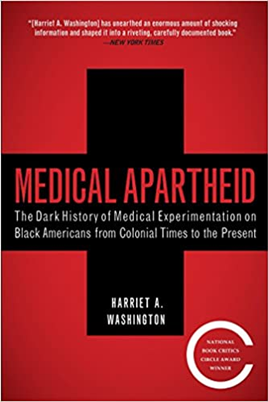
Medical Apartheid with Dr. Baker
Abigail Palotas
If you are looking to earn another Honors credit while also learning about a prevalent issue in American society rooted in medical and racial injustice, consider taking Dr. Parris Baker’s Medical Apartheid course this spring! The class will meet for two hours each week for the first half of the semester. It will involve discussion and written assignments (no exams!) based upon readings and film. The class will also likely feature a guest speaker!
The course will use the book Medical Apartheid by Harriet Washington. Washington is an accomplished journalist, editor, and public health scholar who, in her work, draws attention to the abuses African Americans have faced at the hands of the American healthcare system. She specifically highlights the events of the Tuskegee Experiment, which is the focus of the film, Miss Evers’ Boys, which the class will watch, in which 400 African American men with syphilis were left untreated to allow for study of the progression of the disease. Washington connects past mistreatment such as this with minorities’ current distrust in the medical establishment. Another possible topic of class discussion is the case of Henrietta Lacks, whose cancer cells are the source of the HeLa cell line, the first immortalized human cell line and one of the most important cell lines in medical research. These cells were taken without her consent, so while they have had an enormous role in cancer research, they are also representative of the medical discrimination that continues today. Finally, Dr. Baker hopes to bring in a guest speaker, most likely a local pediatrician or OB-GYN. Infant mortality rates in Erie, PA are double the rates of Pennsylvania as a whole, so perhaps discussion with professionals working directly in the field could provide reasons why and ways to improve upon these rates.

Dr. Baker shared that the course will likely show students that our current society is, “not the America we want it to be.” He hopes to draw attention to the hugely important issue of medical discrimination that has contributed to the mistreatment and death of far too many for far too long. Dr. Baker also plans to discuss ways to invoke change in our healthcare system in order to prevent others from experiencing this discrimination in the future. He recommends the class to all students, but especially to those in healthcare or biomedical engineering. If you are interested in medical ethics and policy, and eager to learn, discuss, and promote change, consider taking Medical Apartheid this spring.